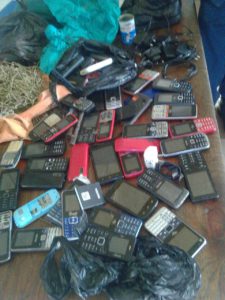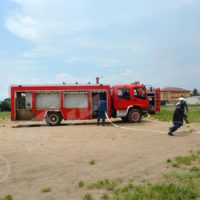Illegal items seized in Mpimba central prison have shown that security control is lax. The police say guards and penitentiary administration are to blame.

Some of the illegal objects seized in Mpimba prison on 17 February
In reaction to evidence of the introduction of prohibited objects and products in the prison, Pierre Nkurikiye, the National Police Spokesman, blames both the guards and prison administration agents.
Search recently carried out in Mpimba central prison in capital Bujumbura have led to the seizure of various illegal items. The items include, among many things, alcoholic drinks, cannabis, knives and mobile telephones.
Nkurikiye says such items threaten security inside and outside the prison. He says that, for example, links have been established between jailed criminals and crimes committed outside the prison. “Some investigations have shown that there are crimes that have been engineered by jailed criminals who gave their commands via telephones”, says Nkurikiye.
Another fact that is well-known to the police is that convicted prisoners (and other conmen) use telephones to swindle money out of people from the outside. Many clients of Econet Leo and Lumitel telephone operators report receiving scam messages.
In some of the messages, scammers pretend to be looking for people to hire. Other messages promise prizes from telephone operators. Typical scam messages include “Econet Leo (or Lumitel) wishes to give you a prize for having been a faithful client”. Victims are then asked to send some kinds of processing fees.
Many people have been victims of such scams. A person who didn’t want to be named said he was recently lured into sending BIF 200,000 to a person who promised him a job in an NGO. When he finally realized he had fallen for a scam, he tried to track the conman. “I finally discovered he was a prisoner. The prison administration helped to get my money back”, he says.
Who lets the illegal items in?
Such crimes and threats call for a tight control over what is allowed in prisons. Some of the prohibited products and objects were seized during search operations conducted on 11 February and 17 February. The fact that such objects were seized in such short intervals of time has raised questions about control procedures at the central prison of Mpimba.
Nkurikiye says the objects and items may have been introduced in Mpimba by visitors who hid them. He also says there must have been complicity of guards and administration agents who were corrupted.
“I am not accusing anyone, but the responsibility is shared. There must have been complicity of both police guards and prison administration agents with visitors who smuggled into the prison prohibited items”, he says.
By accepting shared responsibility, the police spokesman has retreated from his earlier statement that put all the blame on the prison administration. He had told the media he was surprised by the seizure of prohibited objects in so short time intervals “in a home that has someone who is in charge of it”.
Gervais Hajayandi, Director General of Prison Services, told the media the Mpimba police guards were to blame for the smuggling of big objects that cannot be concealed.
Adolphe Havyarimana, the spokesman for the Ministry of Justice, says he will not accuse anyone over the matter. He says he cannot blame anyone as long as “no investigations have been carried out to determine the culprits”. So far, “culprits are only those who have been caught with the illegal items in prison”, he says.
The police spokesman says after the media outcry, guards have now tightened their control procedures. This has led to the seizure, for example, of cannabis a visiting woman wanted to smuggle into the prison on 27 February.



















 IWACU Open Data
IWACU Open Data

